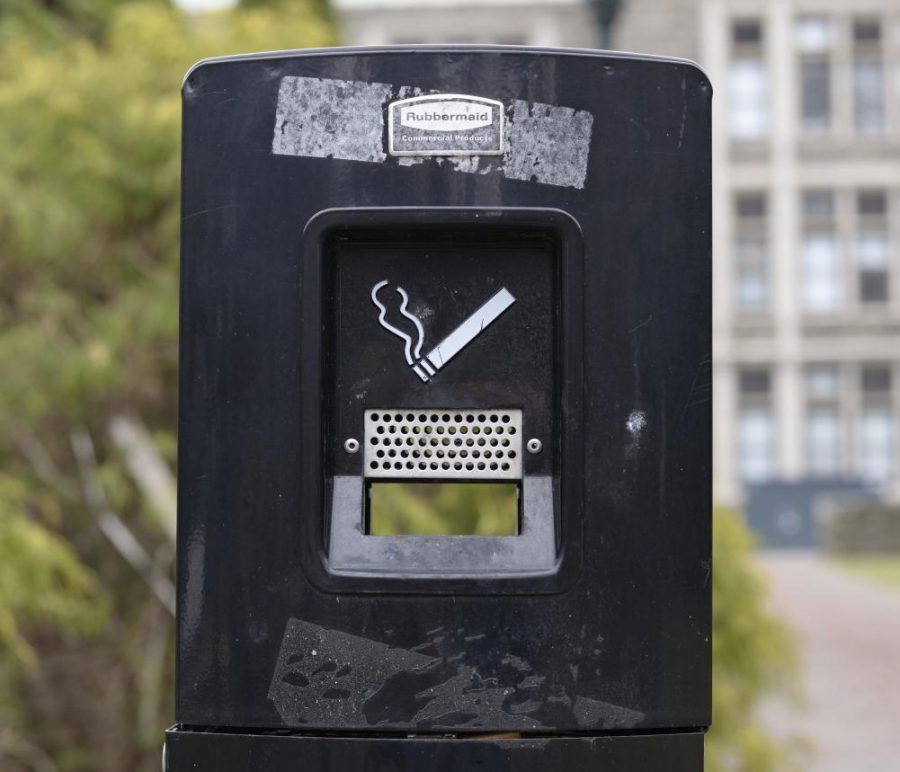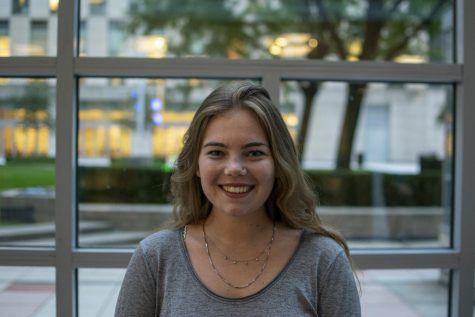Campaign to Eliminate Smoking at Fordham Persists
NIGEL ZWEIBROCK/THE OBSERVER
A 2017 poll showed roughly 80 percent of students supported a smoke-free campus.
March 27, 2019
Smokers and non-smokers at Fordham Lincoln Center can agree on one thing: Smoking itself is prevalent on campus, as cigarette clouds tend to hang in the air of the outdoor plaza no matter the weather. But David Vassar, a reference and instruction librarian, is looking to change that, leading a campaign that aims to eliminate all smoking on campus.
Vassar has coordinated the campaign over the past four years, working closely with other university administration and New York City organizations to make Fordham a 100 percent smoke-free campus.
Lisa Spitzner, community engagement coordinator for a separate citywide movement called NYC Smoke-Free at Public Health Solutions, joined Vassar’s campaign in 2015. Spitzer explained that she “partners with community members, legislators and health advocates to support local efforts to end the devastating tobacco epidemic throughout NYC.”
A component of the campaign are educational events on the harms of smoking. Alongside University Health Services (UHS), Vassar and Spitzner have coordinated an annual Great Fordham Smokeout, which encourages students to stop smoking.
Inspired by other Jesuit universities — like Loyola University — that are tobacco-free, Vassar empcurhasized the Jesuit philosophy of “cura personalis.” He believes that Fordham has a responsibility not only to provide an education to students but also to encourage healthy living. Vassar said he would like to see Fordham institute “policies that enhance health.”
Beyond individuals who choose to smoke, Vassar is concerned for the entire Fordham community, as he believes everyone is affected by the smoke in communal spaces.
“It is primarily the users but also the whole community who are affected by the smoke,” Vassar said.
Exposure to secondhand smoke can result in higher risks of cardiovascular disease and lung cancer. Vassar noted that smokers are in effect polluting the common resource that is everyone’s air.
Vassar stated that Lincoln Center’s outdoor plaza “is a social space that should be used for all, and this is greatly compromised when the quality of air is affected.”
While Vassar recognizes that as adults, students are free to make their own choices, he strongly believes that “there is no inherent right to smoke.”
“The question of free choice becomes moot,” he said. “We’re talking about a behavior that is irrational; the decision to smoke becomes with times less out of rational decision-making but a deeply ingrained compulsion, one which for many ends in a full-blown addiction.”
Yet some students like Luke Farrell, Fordham College at Lincoln Center ’21, strongly disagree with Vassar’s sentiment. “Yes, nicotine is an addiction, but vices are vices, and smoking or the use of nicotine should not be ground for you to have your personal liberties revoked,” Farrell said.
Supporters of the campaign believe that making the campus smoke-free will change how public space is used. They believe that the absence of smoke would make communal spaces more conducive to healthier activities.
But four years into the campaign, Vassar has seen little change in smoking on campus.
Vassar has been in communication with senior administrators and the faculty senate, asking them to consider the possibility of eliminating smoking on campus.
In Spring of 2016, the university instituted a rule that you can not smoke within 50 feet of the building. Robert Dineen, director of public safety at the Lincoln Center campus, explained that “as a result of some complaints from members of the university community regarding persons smoking too close to our building entrances, Public Safety and our colleagues in Facilities Operations worked together on designing ‘no smoking’ signs for each entrance.”
While Vassar believes this is a step in the right direction, he also thinks that the rule is is too hard to enforce to make a meaningful difference.
Yet in Farrell’s experience, “the security guards do enforce the rules. I have been asked to move if I am too close to the buildings.”
Dineen also confirmed that “when a public safety guard observes or becomes aware of someone smoking within 50 feet of a campus entrance, they have a responsibility to direct that person to move further away from the entrance beyond the required distance.”
Farrell continued, “those rules ensure that the common air quality is preserved. Also, when you live in an urban environment, you are already signing off on having a lesser air quality. You can’t really complain about air quality if you’re choosing to live in a city like New York where there is so much air pollution anyways.”
Many students believe a smoke-free Fordham would improve public space on campus. In 2017, campaign organizers conducted a smoking survey, which polled 220 participants. The survey found that roughly 80 percent of students somewhat or strongly agreed that a smoke-free Fordham would be desirable.
“My stance is supported by so many faculty members I’ve spoken with,” Vassar said, “but our students are key here, and they as a body need to want a smoke-free Fordham too.”
Spitzner said that “what really needs to happen is to fully engage college leadership in the process and have their support in discussing the rationale for the policy to staff and the various campus stakeholder groups.”
“We need an in-depth conversation with university leadership,” Spitzner said, “but we have not gotten much interest in at that level.”
In May 2018, Vassar spoke with the United Students Government (USG) about the possibility of making the campus smoke-free. While Vassar believed he had a good reception overall, there were some members of the government that did object to the idea and argued that the ban on smoking would curtail students’ freedom.
Demetrios Stratis, president of USG, said that “while it seems that there is a sense of consensus that making the plaza smoke free is a priority, there are concerns about enforcement and applicability. Further, if this would alienate some students also complicates matters.”
He continued, “We sympathize with the motives of the initiative and recognize its need but we want to allow for a student dialogue on an issue that directly impacts students.”
Vassar noted that while he expects an initial opposition from the student body, he believes “that a smoke-free policy will benefit the Fordham community — and especially Fordham students — in the long run.”
He referenced Mayor Michael R. Bloomberg’s motion to forbid smoking in all restaurants and bars in 2002, explaining that now the policy is widely respected. He commented that “from the standpoint of both personal and public health, it has proven a win-win.”











